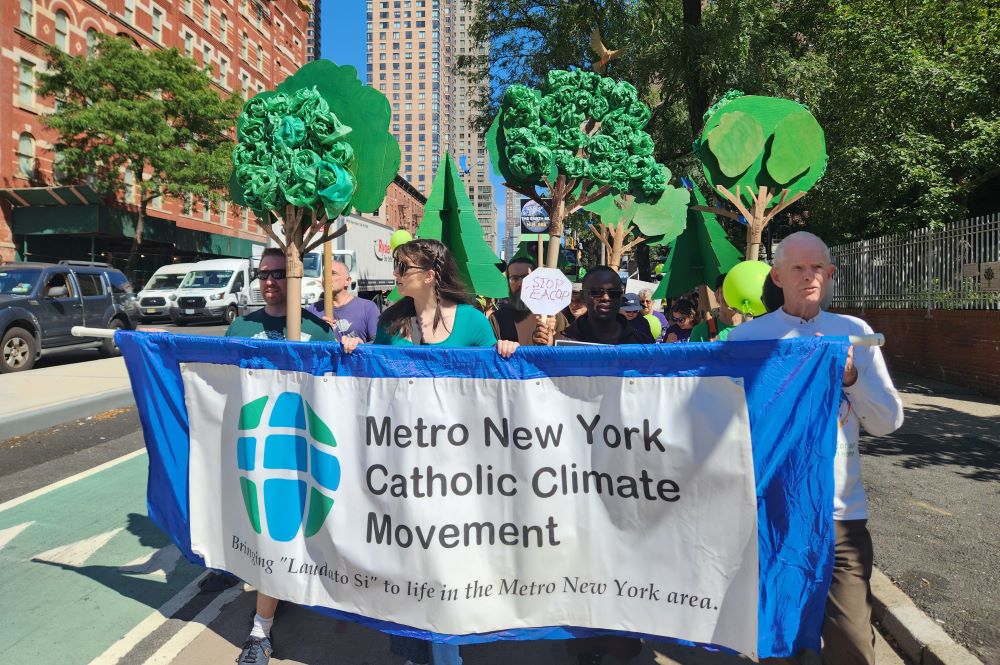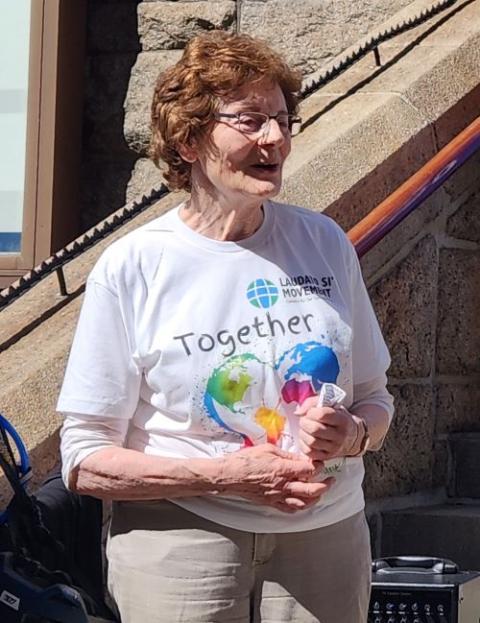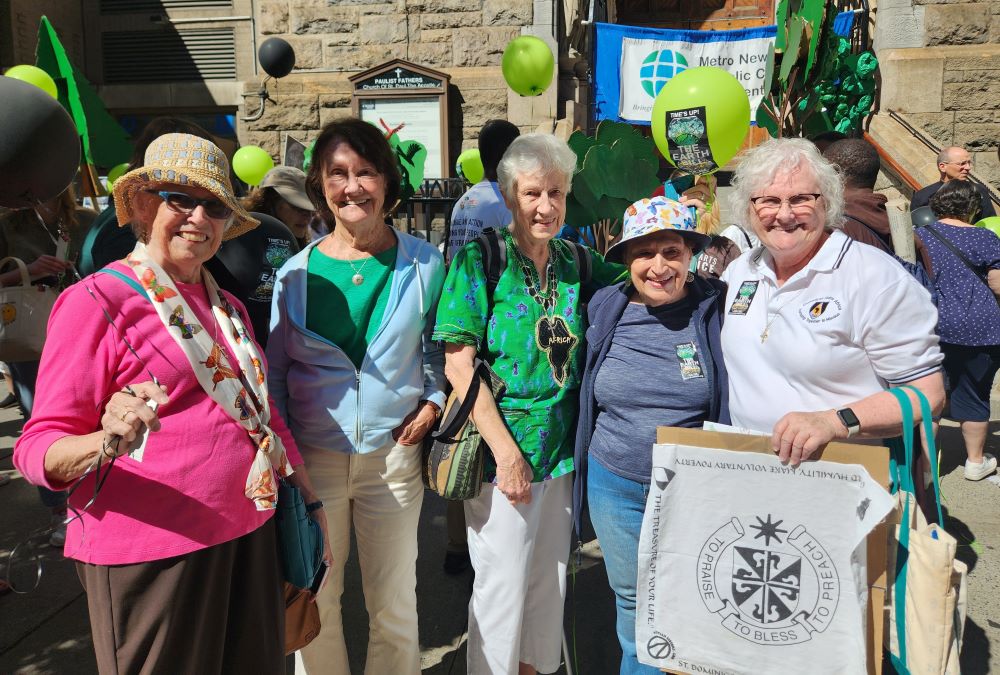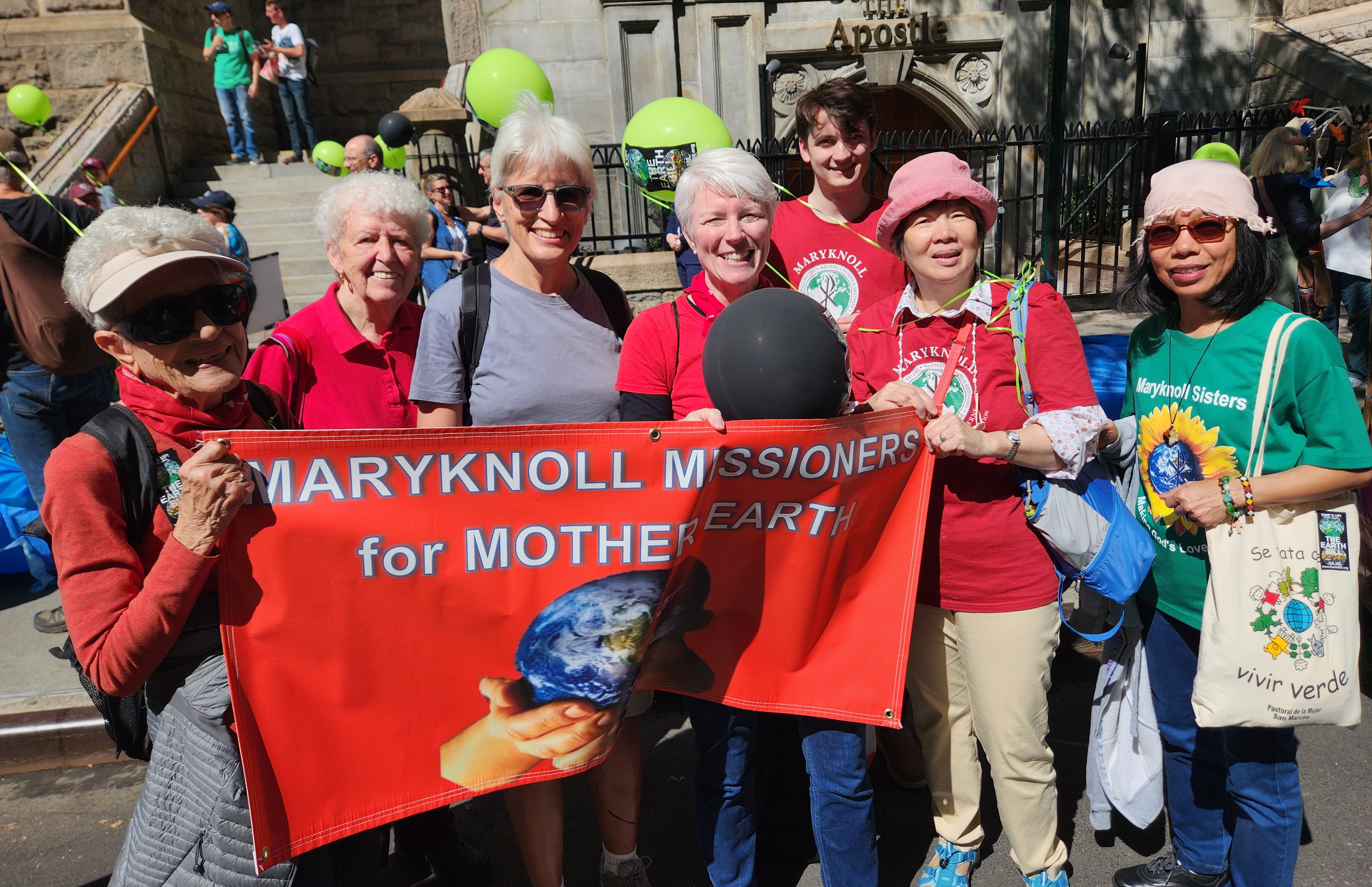
Participants with the banner of the Metro New York Catholic Climate Movement march from St. Paul the Apostle Church to the main rallying point for the Sept. 17 climate march in midtown Manhattan. (GSR photo/Chris Herlinger)
With a busy week of marches, workshops and a one-day United Nations summit behind them, sisters and other Catholic environmental activists say they must continue and expand their work to increase public pressure for change on climate action.
"Action and accountability are what we need to aim at," said Sr. Cynthia Mathew, who represents the Institute of the Blessed Virgin Mary/Loretto at the United Nations and was one of dozens of Catholic sisters and activists who attended a major Sept. 17 climate march in Manhattan calling on countries to end their dependence on fossil fuels.
But while heartened by the Catholic presence at that event — and in support for a one-day United Nations "Climate Ambition Summit" three days after the march — several marchers and activists said in interviews with Global Sisters Report that they are frustrated that their message is still not registering with many in the pews.
Marcher Sr. Claire Regan, a member of the Sisters of Charity of New York, said she has a close relative who is a "climate denier — that breaks my heart. We have a responsibility to the environment and our planet, our common earth."
And despite global attention to Pope Francis' 2015 encyclical "Laudato Si', On Care for Our Common Home," Regan believes that "somehow a lot of people have separated religion from the world."
"People attend church, take Communion — but the broader social issues have been called secular and downgraded," she said, noting that many in the pews may admire the climate activism of sisters like herself, but see it as something in the "political realm."

Nancy Lorence, a founding member of the Metro New York Catholic Climate Movement (GSR photo/Chris Herlinger)
Regan said, sadly, there is little discussion of Laudato Si' at her parish in the New York borough of the Bronx.
But to activists like Regan, the importance of climate change and protection of earth and creation cannot be overstated enough — with Laudato Si' becoming a guidepost and sustaining inspiration.
"Everything comes together under the words of Laudato Si'," she said, with many pressing social issues converging together. "They're all connected."
In a separate interview, Nancy Lorence, a founding member of the Metro New York Catholic Climate Movement, expressed similar sentiments, saying that after several years in which demonstrations and marches were sidelined due to the global pandemic, it felt good and energizing to see so many people — particularly young people — involved in a large-scale march.
But Lorence agreed with Regan that awareness of the landmark encyclical remains vague, at best, in many New York City parishes and that there has not been a diocesan push "for parish priests to embrace Laudato Si' " — though she and other activists are working with the archdiocese to try to give the encyclical more visibility within New York City churches.

A group of Catholic sisters at a Sept. 17 event to raise awareness and increase public pressure for change on climate action. Adrian Dominican Sr. Durstyne "Dusty" Farnan is at far right. With her, from right, are Religious of the Sacred Heart of Mary Srs. Kathleen Kanet, Veronica Brand, Jacquelyn Porter and Virginia Dorgan. (GSR photo/Chris Herlinger)
She hopes that Pope Francis' next letter on the environment, entitled "Laudate Deum," or "Praise God," and expected to be released Oct. 4, will raise visibility and encourage more parishioners to become active in the cause of environmental awareness. Lorence told GSR she believes the lack of concern in many parishes is not "willful negligence — it's just that people aren't paying attention to it."
Still, it is not as if New Yorkers are strangers to the perils of climate events.
"Let's not forget that in the Metro New York area, over 40 people died, many of them trapped in their flooded basement apartments, when Hurricane Ida passed through here two years ago; and that (this past summer) we've all experienced the smoke from the forest fires in Canada, and longer and hotter summers than ever before," she said.
"The issue of climate change affects all of us, and will get worse without concerted action on our part. As Catholics, we have a responsibility to address this issue, as Pope Francis has said."
Lorence notes that New York's recovery from the extensive damage of Hurricane Sandy in 2012 was far quicker than the recovery developing countries experience from climate-related events because "we have more resources."
Advertisement
She added that people need to become aware of the gravity of such events elsewhere in the world — that climate change is truly a global problem, "requiring global commitments and awareness."
"That's a key message for Catholics — it's not just about us (in the United States)," she said. "It's about our brothers and sisters, catholic and non-Catholic, in other parts of the world."
That resonates with Mathew, an Indian sister, who says it is important for U.S. citizens to become aware of the wider context and effects of climate change, as well as its political implications.
In some countries, including India, "it is difficult to challenge governments" and often the response to criticism is prison for those advocating for change and for the protection of human rights.
"Whenever we fight for the people, the Indigenous, the marginalized," Mathew said, "it becomes difficult."
Yet Mathew believes at all levels — locally, nationally, globally like at the United Nations — it is important to continue to march, write letters and employ social media to continue grassroots efforts.
'The issue of climate change affects all of us, and will get worse without concerted action on our part. As Catholics, we have a responsibility to address this issue, as Pope Francis has said.'
—Nancy Lorence
Lorence and others believe advocacy must also be accompanied by personal responsibility in reducing the use of energy, in addition to the institutional responsibility by churches, schools, municipalities and private industry. "It's on all of us to reduce our use of energy, " Lorence said.
There are signs of hope. She noted that two Jesuit parishes in Manhattan — including hers, the Church of St. Francis Xavier — have initiated efforts to reduce energy-related emissions, the main driver of global warming.
Both Lorence and Regan are also encouraged by the activism of young Catholics, several of whom spoke at a pre-march event for Catholics organized by the Metro New York Catholic Climate Movement and the Catholic Climate Covenant at St. Paul the Apostle Church near Fordham University's Lincoln Center campus.
One of them, Daniel Bajada, a senior at Regis High School in Manhattan, spoke of the ways he said "developing countries disproportionately face more severe heat waves, floods and droughts."
Bajada cited Pakistan as an example of a country whose "carbon emissions are less than 1% of the world's" but is "ranked among the 10 most vulnerable countries to climate change." Flooding in the last year in Pakistan, he noted, affected "more than 33 million people … and an estimated 8 million were displaced. Innocent people are being hit the hardest."
"Catholic means universal," he said, "and being on earth is a universal experience. It is our job to take action."

A group of Maryknoll missioners at a Sept. 17 pre-march event for Catholics organized by the Metro NY Catholic Climate Movement and the Catholic Climate Covenant at St. Paul the Apostle Church near Fordham University's Lincoln Center campus. (GSR photo/Chris Herlinger)
Others attending the march underlined that action — such as Sr. Catherine Darcy, a member of the Sisters of Mercy of the Americas, urging fellow Catholic President Joe Biden "to do more" on curbing fossil fuels, and Blair Nelsen, the lay representative at the United Nations for the Congregation of the Sisters of St. Joseph of Peace and the executive director of the New Jersey-based eco-spiritual nonprofit Waterspirit.
"It's important for people to show solidarity with others today," Nelsen said. "Our very souls are at stake. This is an existential crisis."
Regan believes events like the march both heighten awareness and offer solidarity among those concerned with climate issues.
"We have to continue this work," she said. "And we also have to support each other."
These are all reminders, Lorence said, that strides are being made and that more people, including individual Catholics are "taking up the issue" of environmental protection and care for creation.
"Catholics," she said, "are people of hope."







